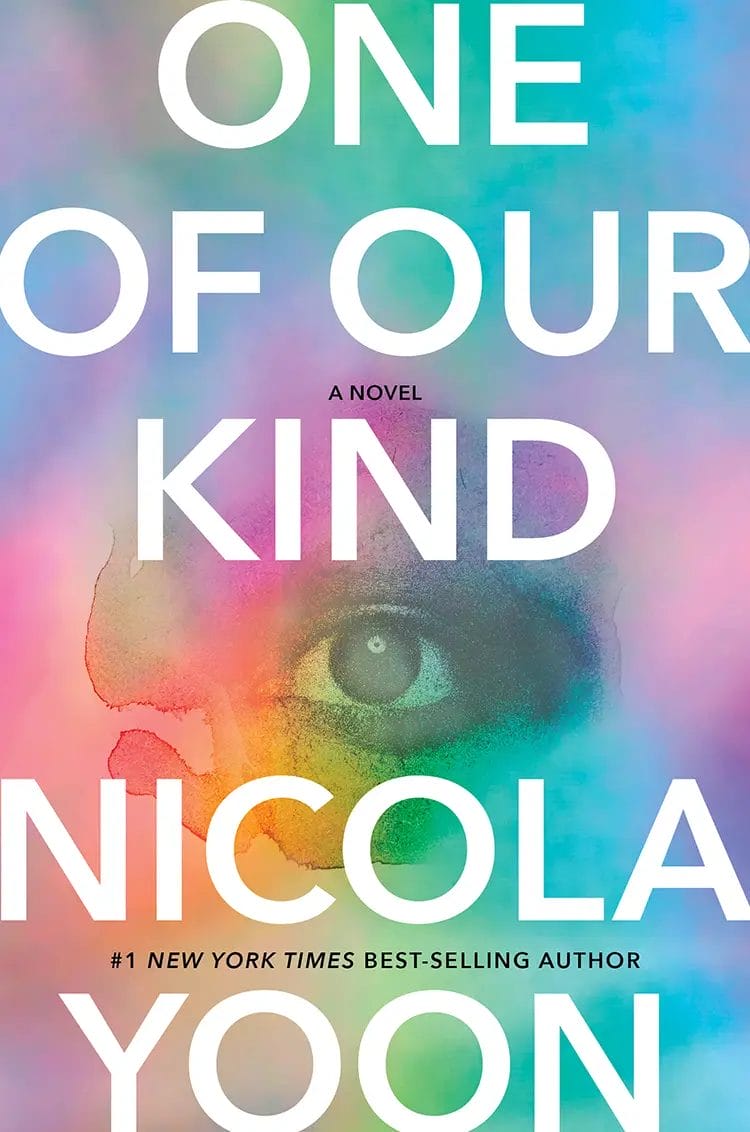

One of Our Kind
By Nicola Yoon
Jasmyn and King Williams move their family to the planned Black utopia of Liberty, California hoping to find a community of like-minded people, a place where their growing family can thrive. King settles in at once, embracing the Liberty ethos, including the luxe wellness center at the top of the hill, which proves to be the heart of the community. But Jasmyn struggles to find her place. She expected to find liberals and social justice activists striving for racial equality, but Liberty residents seem more focused on booking spa treatments and ignoring the world’s troubles.
Jasmyn’s only friends in the community are equally perplexed and frustrated by most residents’ outlook. Then Jasmyn discovers a terrible secret about Liberty and its founders. Frustration turns to dread as their loved ones start embracing the Liberty way of life.
Will the truth destroy her world in ways she never could have imagined?
Thrilling with insightful social commentary, One of Our Kind explores the ways in which freedom is complicated by the presumptions we make about ourselves and each other.
My thoughts:
This is going to be a really tough one to review because the things I want to talk about all have to do with the reveal of what was actually happening, and I don’t want to spoil anything.
When I read that this was reminiscent of “The Stepford Wives” I was intrigued. I remember seeing the original movie when I was far too young to really understand it, but I know I was creeped out that men were basically turning women into a sort of robot to make them behave a certain way. This novel evokes that same sensation but with a truth that is even more unsettling than I thought it would be.
The story centers on Jasmyn and King Williams, a young couple who move to Liberty, California, a gated community that promises Black excellence and utopian ideals for them, their young son, and the baby on the way. On the surface, Liberty is a dream come true: a community designed for Black families to thrive without the interference of systemic racism. Everyone who lives in Liberty – even the police officers – are Black, so a lot of their fears can be set aside. For Jasmyn, however, it quickly becomes clear that this utopia is too good to be true, and this unease is heightened when she goes to the local spa that everyone raves about and hears someone screaming.
The allure of Liberty is undeniable – the manicured lawns, the luxurious amenities, the promise of safety and success – but it’s the community’s apathy toward the atrocities happening to Black people in the outside world that raises red flags. The novel takes place alongside a recent event that claimed the life of a Black woman and put her baby in the hospital. Jasmyn expects a community of activists, people who understand the importance of pushing back against oppression, yet she finds neighbors more concerned with spa treatments and social climbing than the struggles of the world beyond the gates. This dissonance is the first clue that Liberty’s promise comes with strings attached.
The author delves into themes of Black identity, cultural erasure, and the ways in which systemic racism adapts and persists, even in spaces meant to counteract it. The parallels to real-world issues, such as gentrification and cultural appropriation, are undeniable, and Yoon handles them with nuance and depth. She also does an exceptional job of building tension, layering subtle hints of the darkness lurking behind Liberty’s polished exterior. Jasmyn’s husband, King, quickly embraces the Liberty lifestyle, immersing himself in the community’s mission and hanging out at the exclusive wellness center that sits at its heart. His transformation is both compelling and unsettling, a vivid reminder of how easily people can be seduced by comfort and belonging, even at the cost of their identity.
I mentioned earlier that the real power of the novel lies in its shocking final reveal. Without giving too much away, the twist flipped my expectations, offering a conclusion that was both thought-provoking and deeply unsettling. I somewhat expected the story to follow a trajectory similar to the movies Get Out or Antebellum, but the author flipped the script, forcing readers to confront uncomfortable truths about self-preservation and the cost of perfection. I couldn’t help but imagine this book as a Jordan Peele film.
Nicola Yoon has crafted a modern-day parable about the dangers of utopia, the complexities of identity, and the ways in which systems of power perpetuate themselves, even in spaces designed to resist them. For anyone who enjoys unsettling, thought-provoking fiction, this is a must-read. It’s the kind of book that creeps under your skin and stays there.













